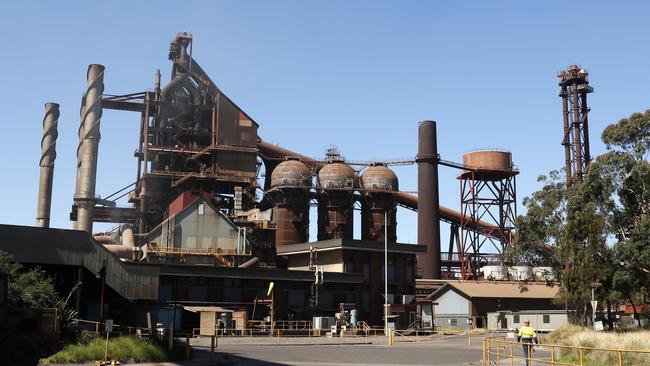BlueScope guilty of attempted steel price fixing, Federal Court finds
The steelmaker, and former executive Jason Ellis, have been found guilty of attempted price fixing in a landmark court case.

BlueScope Steel tried to fix the price of steel as its profits tumbled almost a decade ago, and managing director Mark Vassella was found to be at least aware of aspects of the attempts according to a Federal Court ruling, with the ACCC walking away with a major victory in its pursuit of cartel behaviour.
Justice Michael O’Bryan handed down his decision on the cartel case on Friday, finding that BlueScope tried to get eight other Australian steel distributors, as well as Taiwanese manufacturer Yieh Phui, to lift the price of flat steel products over a 10-month period between September 2013 and June 2014.
At the time steel prices were tumbling and BlueScope’s Australian business was under considerable pressure.
In his judgment on Friday Justice O’Bryan said BlueScope Coated Industrial Products Australia (CIPA) and former sales and marketing manager Jason Ellis engaged in conduct that was aimed at lifting prices across the Australian steel market by trying to reach an “understanding” with BlueScope competitors over baseline steel prices for its own products.
The Australian Competition and Consumer Commission had alleged that Mr Ellis and other senior BlueScope executives contacted Australian distributors and overseas steel mills to try to force up prices in a bid to help the Australian steel major ride out a global downturn in prices caused by a glut of steel on the market.
The ACCC says BlueScope used a “carrot and stick” approach to try to force offshore steelmakers to play ball, threatening imports with anti-dumping complaints if they did not lift steel prices into Australia.
At the same time BlueScope offered to publish its own prices to its competitors, telling them they could safely lift their own prices without the risk of losing sales volumes if they fell into line with the steel major’s plans.
Justice O’Bryan said BlueScope’s threats of anti-dumping complaints came at a time its business under significant threat from cheaper imports, noting that import pricing posed a “significant constraint” on BlueScope’s own pricing across a suite of products.
“Movements in BlueScope’s prices for these products typically reflected movements in import prices,” he said.
At the time of the cartel behaviour some of BlueScope’s most profitable lines were also coming under threat from growing import levels.
“Historically, BlueScope’s range of painted products faced relatively lower levels of import constraint. However, as at 2013, those products also faced significant import competition, with independent import penetration increasing from approximately 5 per cent of Australian consumption in the 2008 financial year to over 10 per cent in each month from October 2012 to March 2013,” he said.
Justice O’Bryan said on Friday that, while there was little evidence BlueScope had succeeded in fixing prices to any great degree, the ACCC’s evidence showed the company’s promotion of “recommended resale prices” was an inducement for its competitors to set prices across the industry.
The ACCC alleged that Mr Vassella was aware of “certain aspects of the conduct” through the period
At the time Mr Vassella was the chief executive of Australia and New Zealand at that time. He is now the company’s managing director.
Justice O’Bryan said that, while evidence of Mr Vassella’s involvement was “sparse”, he was aware of elements of the company’s benchmarking strategy.
“I find that Mr Vassella was aware of the following elements of the benchmarking strategy: that CIPA was promoting its distribution market price lists as recommended resale prices; that CIPA’s aim in doing so was to bring about an increase in prices at the distribution level of the market, which would assist CIPA in both increasing its own prices and increasing sales volume to distributors,” he said on Friday.
Justice O’Bryan said Mr Vassella was also aware that “CIPA was supporting the strategy by reducing tactical pricing support; that CIPA also wished to support the strategy by aligning NZSA’s prices in the market with CIPA’s prices; that the strategy was having some success in the market; and that CIPA proposed to raise the threat of anti-dumping actions with overseas steel mills.”
But the evidence did not support any findings that Mr Vassella was aware that, as part of its benchmarking strategy, the company was attempting to induce other distributors to reach a price fixing understanding with BlueScope in relation to their pricing.
But, while Justice O’Bryan made no further direct findings against Mr Vassella, he said Mr Ellis was not acting as a rogue agent in his attempts to fix steel prices.
“I find that the conduct of Mr Ellis was engaged in on behalf of BlueScope and was within the scope of his actual or apparent authority. His conduct is therefore to be attributed to BlueScope,” the judgement says.
BlueScope said on Friday it was “disappointed” with the decision and is considering its options for appeal. The company faces a fresh round of hearings in April 2023 on potential penalties.
“In the time since BlueScope first became aware of the conduct which led to the legal proceedings, BlueScope has implemented a number of steps to substantially strengthen its programs to enhance awareness of, and compliance with, competition law,” said BlueScope chairman John Bevan.
ACCC Commissioner Liza Carver said the ruling was an “important” one which had the potential to strengthen the regulator’s position in future cases of attempted cartel conduct.
“This should serve as a strong warning to all businesses and individuals that even attempting to reach a price fixing arrangement with one or more competitors may have very serious consequences, on both a corporate and personal level,” she said.
BlueScope shares closed up 8c, or 4 per cent, at $18.22 on Friday, in line with the broader market.

